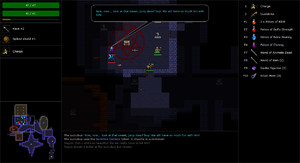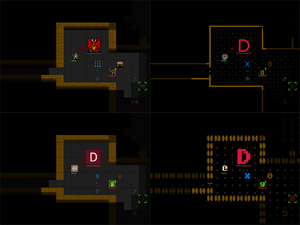Difference between revisions of "Zorbus"
Jump to navigation
Jump to search
| (5 intermediate revisions by the same user not shown) | |||
| Line 5: | Line 5: | ||
|released = March 2019 | |released = March 2019 | ||
|relver = Alpha | |relver = Alpha | ||
|updated = | |updated = September 2024 | ||
|updver = r60 | |updver = r60.7 | ||
|licensing = [[Commercial]], [[Closed source]] | |licensing = [[Commercial]], [[Closed source]] | ||
|language = [[Pascal]] | |language = [[Pascal]] | ||
Latest revision as of 17:37, 13 September 2024
| Zorbus | |
|---|---|
| Stable game | |
| Developer | Joonas Hirvonen |
| Theme | Fantasy |
| Influences | Traditional fantasy roguelikes, Gold Box games, OD&D / AD&D / D&D 3e |
| Released | March 2019 (Alpha) |
| Updated | September 2024 (r60.7) |
| Licensing | Commercial, Closed source |
| P. Language | Pascal |
| Platforms | Windows, Linux (Wine), Mac OS X (Wine) |
| Interface | Tiles, ASCII, Keyboard, Mouse, Controller |
| Game Length | 5-8 hours |
| Official site of Zorbus | |
Zorbus is a free, fantasy-themed, tile-based, turn-based, traditional roguelike game. Your goal is to delve deep into a dungeon and find a portal to a mythical place called the Zorbus, where a mere mortal can ascend to demigodhood. You can recruit other creatures along the way so you don't have to adventure alone.
Zorbus does not have item identification or a hunger mechanic.
Thematically Zorbus draws influence from the late 70s and early 80s tabletop D&D campaigns, adventures, and lore.
The rule system for the game is slightly influenced by the d20 system used in the 3rd edition of Dungeons & Dragons.
Zorbus needs Windows 7 or newer, but can be run on Linux with Wine and on Mac with PlayOnMac, WineBottler, or CrossOver.
Features
- A live dungeon: The dungeon is more than just empty rooms and corridors. Zorbus features diversely shaped levels with themed content (throne rooms, prisons, hidden treasure caches, etc.) with good connectivity between the areas. The game also has over 4000 sound effects and hundreds of ambient tracks to truly make the dungeon feel alive.
- Dynamic Lighting: There are light sources present both as dungeon furniture and in the hands of creatures, and these both can be lit and unlit. Some creatures have darkvision. Creatures react to light and sound.
- Complex AI: The dungeon denizens fight each other, flee when threatened, and try to gather their friends to overcome a threat. Most creatures can use items, and can also pick them up from the dungeon floor. Creatures are not silent either but comment on things with speech bubbles.
- No character classes: On each level up, you point buy skills and talents (mostly combat maneuvers and spells).
Controls and UI
- The game has a targeting system, making it very easy to use ranged attacks and talents.
- Usable items and talents can be assigned to quick-slots.
- The display size can be configured. You can play in windowed mode or fullscreen and with 32x32, 48x48, or 64x64-pixel tile graphics or ASCII characters.
- The font can be changed, and the text size can be adjusted.
- Keybindings are configurable.
- Mouse control is supported, but is not ideal for playing the game.
- A game controller can be used.

